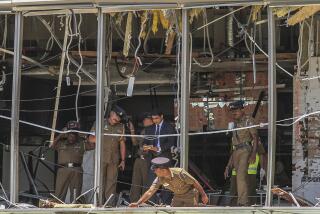Kenya sends bombing suspects to Uganda
- Share via
Reporting from Johannesburg, South Africa — A total of six Kenyan men accused in last month’s bomb attacks on fans watching the soccer World Cup final in Kampala have been transferred to Uganda, while another suspect has been released on bail, Kenyan authorities said.
Salmin Mohammed Khamis, 34, who was released Monday, is accused of harboring some of the suspects. Khamis was acquitted of involvement in the 2002 bombing of an Israeli-owned hotel in Mombasa. In 2003, he confessed to being part of a plot, never carried out, to blow up the U.S. Embassy in Nairobi, the Kenyan capital, Associated Press reported Wednesday.
Shabab, a rebel group that controls much of Somalia, has claimed responsibility for the bomb attacks at a rugby club and an Ethiopian restaurant in the Ugandan capital last month, killing 76 people.
U.S. authorities have long been sensitive to fears of terrorism in East Africa, after the simultaneous 1998 bombings of the American embassies in Nairobi and Dar-es-Salaam, Tanzania, that killed about 220 people.
The recent arrests underscore fears that Islamic extremists may be regaining a footing in Kenya, with reports of Shabab recruiting in Somali refugee camps in northern Kenya. The Kenyan military also has been accused of recruiting in the camps.
Muslim human rights activists and Mbugua Mureithi, a lawyer for three of the suspects, who were sent to Uganda in late July, accused the police of bypassing normal procedures in the transfer.
Mureithi said there was no substantial evidence linking his clients — Idris Magondu, Hussein Hassan Agade and Mohammed Adan Abdow — to Shabab or the attacks.
Kenyan police claim to have linked Abdow to Shabab on the basis of satellite phone calls from Mogadishu and Kampala.
The names of the other three men who were sent to Uganda on Monday have not been released.
Agade and Abdow are street traders; Magondu is a driver. Abdow, a Kenyan of Somali origin, comes from the small eastern town of Tawa, and the other two live in Nairobi. The families of the three declined to talk to The Times.
Two of the men were members of a Muslim street preachers’ group registered with Islamic authorities in 2005. Another member of the preachers’ group, Hassan Mohammed Dafala, was arrested by Kenyan police last month but later released.
According to police documents, officers seized a vehicle, about eight cellphones, computers, and CDs during searches of Mureithi’s clients’ homes late last month. They also swabbed shoes and floors in a search for traces of explosives.
“They can’t be financiers of terrorism,” said Mureithi, referring to the men’s jobs as driver and traders. Agade had borrowed a few dollars from his father the week before his arrest. He said Magondu and Abdow had never been to Uganda.
“We have the law on our side. What might not be on our side is public opinion and politics,” Mureithi said.
robyn.dixon@latimes.com
More to Read
Sign up for Essential California
The most important California stories and recommendations in your inbox every morning.
You may occasionally receive promotional content from the Los Angeles Times.













